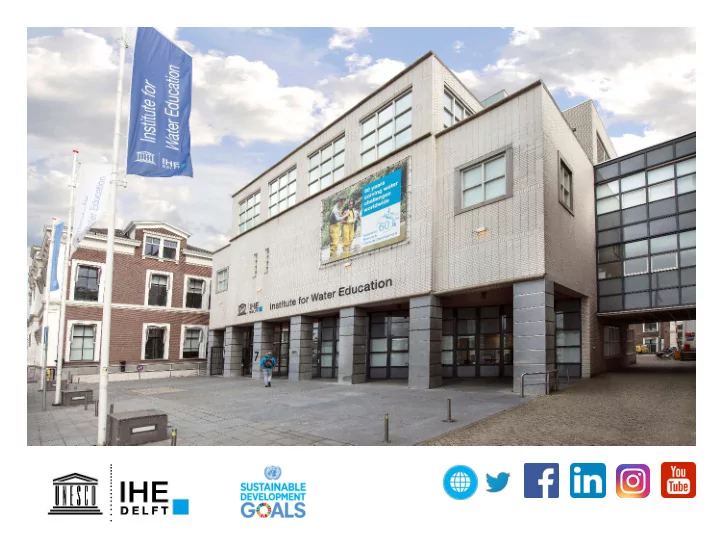

IHE Delft Institute for Water Education is the largest international graduate education institute in the field of water. The institute confers fully accredited MSc degrees and PhDs. Since 1957 the Institute has provided education to more than 23,000 water professionals from over 190 countries, the vast majority from the developing world. 124 PhD fellows* are currently enrolled in water-related research. The Institute carries out numerous research and capacity development projects throughout the world. *PhD fellows active per 31-12-2018
Mission and Ambition Mission IHE Delft works in partnership to strengthen capacity in the water sector to achieve global sustainable development. Ambition Through our overarching work on capacity development, IHE Delft aims to make a tangible contribution to achieving all Sustainable Development Goals in which water is key. We strongly believe that capacity development, in partnership, is the key to addressing today’s water challenges.
Core activities under capacity development Education & Training Research & Innovation Institutional Strengthening 5 accredited MSc With over 140 academic strengthen the programmes in water staff and 124 PhD fellows programmes of 200-250 students active in water-related, universities and research Short & online courses problem-focused and institutes as well as the Tailor made trainings solution oriented knowledge and capacity research on development base of ministries and issues . other water sector organizations .
Education & Training IHE Delft offers a wide range of flexible, high quality, specialized educational programmes to respond to the needs of diverse clients from the water sector. • MSc programmes • Short courses • Online courses • Tailor-made training
MSc programmes Water Management (106 ECTS) The scientific study of water resources with practical planning and management skills. Urban Water & Sanitation (106 ECTS) Water supply, sanitation and water engineering and management, particularly in urban areas. Environmental Science (106 ECTS) Conservation and prudent use of natural resources for the benefit of society. Water Science & Engineering (106 ECTS) Hydrological and hydraulic processes and modelling tools for improved water management in coastal zones, river basins and agricultural areas. Sanitation (68 ECTS) One-year programme focusing on non-sewered sanitation, delivering graduates with the qualifications required by the sanitation sector.
Joint MSc programmes Joint programmes are offered in collaboration with renowned partner institutes, have varying start and end dates, and part of the programme is given at a partner institute, often in another country/ continent.
PhD fellows in 2018
Alumni network
IHE Delft Institute for Water Education www.un-ihe.org
Two projects
Dealing with drought: nature-based water storage for food security in Africa Pieter van der Zaag
Water storage ‘Globally, the stage is set for a tremendous and unprecedented increase in the number of dams, with numbers expected to swell by 16 percent by 2030, and storage volume expected to increase by about 40 percent’ Storage deficit (Differences of required storage including EWRs and actual storage, in 10 6 m 3 ) World Bank, 2016 Source: Gaupp et al., 2015
Conventional water storage solutions are not adaptive Large dams Large potential +/- impacts: - economic - social - ecological - geo-political - else? Characteristics: - Hard - Instantaneous → create path dependency - Centralising - Long-lived - Inflexible
Sand rivers: a nature-based water storage alternative River beds of seasonal rivers To be found in many arid and semi-arid regions with 400-600 mm/yr of rainfall; in Africa comprising 30% of the land area. These areas are often considered marginal, lost to socio-economic development, among others due to water scarcity.
Sand rivers: a nature-based water storage alternative River beds of seasonal rivers • Tekeze sub-basin, Tigray region, Ethiopia • Kajiado, Kenya • Mzingwane sub-basin in Matabeleland, Zimbabwe • Limpopo basin in Gaza Province, Mozambique Arid African Alluvial Aquifers - A4Labs and associated projects (see: http://A4Labs.un-ihe.org)
Sand rivers: a nature-based water storage alternative Mzingwane, Zimbabwe
Sand rivers: a nature-based water storage alternative Mzingwane, Zimbabwe
Sand rivers: a nature-based water storage alternative Chokwe, Mozambique
• Sand dam in seasonally dry river beds Slide by Prof vd Zaag
• Coverag e
Wonji - Ethiopia 18 months ratooning Total biomass production Harvest index 1.0 Crop efficiency 1.8 (C3-C4) Moisture content 0.59 Average yield 100 ton/ha
Wonji – water productivity Net WP (kg/m 3 ) Yield (ton/ha) AETI T Gross WP Gross WP (mm/season) (mm/season) (kg/m 3 ) (Yilma, 2017) Sugarcane 99.85 1,926 1,638 5.22 6.13 5.9-6.6 WP on the low side
Kpong – water productivity Yield (ton/ha) AETI T Gross WP Net WP (kg/m 3 ) (kg/m 3 ) (mm/season) (mm/season) Banana 37.59 1,022 793 3.72 4.85 Rice s1 4.15 495 356 0.86 1.25 Rice s2 3.99 503 382 0.82 1.11
Recommend
More recommend